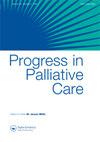父母在晚期儿童癌症预后沟通方面的经验
IF 0.8
Q4 PUBLIC, ENVIRONMENTAL & OCCUPATIONAL HEALTH
引用次数: 0
摘要
晚期癌症的预后信息令人痛心。我们调查了30位来自印度三级癌症中心的晚期癌症患儿的父母,以了解父母对预后信息的偏好。我们发现,17/20(85%)的家长希望获得尽可能多的预后信息,并希望以数字形式表达。除2/20(10%)家长外,所有家长都对预后信息感到不安,但仍想了解更多预后信息。发现信息“有些”或“非常”令人不安的家长(占比40%)表示,了解预后很重要,或者有助于做出决策。因此,尽管许多父母发现关于他们患有癌症的孩子的预后信息令人不安,但对预后信息感到不安的父母不太可能想要它。预测信息令人不安的本质并没有减少父母对这些信息的渴望或他们的希望。本文章由计算机程序翻译,如有差异,请以英文原文为准。
Parents’ experiences with prognosis communication in advanced pediatric cancers
Prognostic information in advanced cancers is distressing. We surveyed 30 parents of children with advanced cancer from a tertiary cancer center in India to understand parental preferences for prognostic information. We found that 17/20 (85%) parents desired as much information about prognosis as possible and wanted it expressed numerically. All parents found information about the prognosis to be upsetting but still wanted additional information about the prognosis, except, 2/20 (10%). Parents who found information ‘somewhat’ or ‘extremely’ upsetting 8/20 (40%) were no less likely to say that knowing prognosis was important, or that it helped in decision-making. Thus, although many parents find prognostic information about their children with cancer upsetting, parents who are upset by prognostic information are no less likely to want it. The upsetting nature of prognostic information does not diminish parents’ desire for such information or their sense of hope.
求助全文
通过发布文献求助,成功后即可免费获取论文全文。
去求助
来源期刊

PROGRESS IN PALLIATIVE CARE
PUBLIC, ENVIRONMENTAL & OCCUPATIONAL HEALTH-
CiteScore
2.60
自引率
11.80%
发文量
24
期刊介绍:
Progress in Palliative Care is a peer reviewed, multidisciplinary journal with an international perspective. It provides a central point of reference for all members of the palliative care community: medical consultants, nurses, hospital support teams, home care teams, hospice directors and administrators, pain centre staff, social workers, chaplains, counsellors, information staff, paramedical staff and self-help groups. The emphasis of the journal is on the rapid exchange of information amongst those working in palliative care. Progress in Palliative Care embraces all aspects of the management of the problems of end-stage disease.
 求助内容:
求助内容: 应助结果提醒方式:
应助结果提醒方式:


